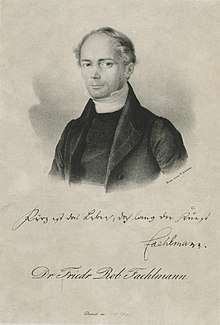Friedrich Robert Faehlmann
Friedrich Robert Faehlmann (Fählmann) (31 December 1798 in Ao Manor – 22 April 1850 in Tartu) was an Estonian writer, medical doctor and philologist active in Livonia, Russian Empire. He was a co-founder of the Learned Estonian Society at the University of Dorpat and its chairman (1843-1850).

Faehlmann was born to the family of the manager of Ao Manor in Järva County. In 1825 he graduated from the medical department of the University of Dorpat. In 1827 he earned the M.D. degree and become a physician in Dorpat (now Tartu). In addition he gave lectures in Estonian language in the university during 1842–1850.
Since the 1820s he was interested in the Estonian culture and in 1838 he became a co-founder of the Learned Estonian Society.
Faehlmann brought attention to the Estonian folklore of Kalevipoeg, which after his death has become the Estonian national epic by the efforts of another Estophile, Friedrich Reinhold Kreutzwald. He also recorded a number of tales.
In 1840 a story "Koit ja Hämarik" (Dawn and Dusk) was first published.
Fählmann died of tuberculosis in Dorpat.
Publications
- M.D. dissertation "Observationes inflammationum occultiorum" (1827)
- "Versuch einer neuen Anordnung der Conjunctionen in der estnischen Sprache" (1842)
- "Ueber die Declination der estnischen Nomina" (1844)
- "Die Ruhrepidemie in Dorpat im Herbst 1846" (1846)
- "Verhandlungen der Gelehrten estnischen Gesellschaft" (1852)
In memoriam
In 1930 a bronze bust (sculptor V. Mellik) was installed in Tartu.[1]
In 1998 the Estonian Post issued a postmark in the commemoration of the 200th anniversary of his birth.[2][3]